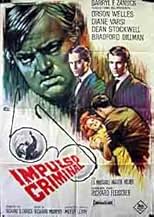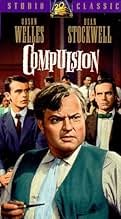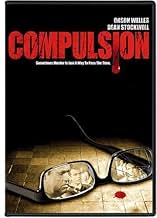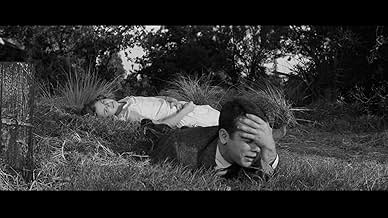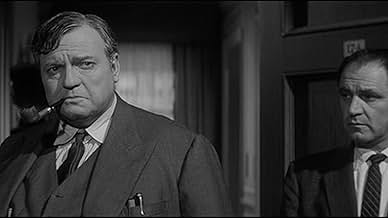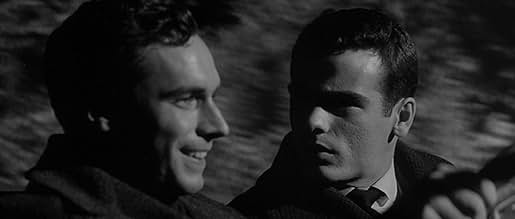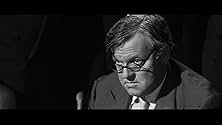IMDb RATING
7.4/10
8.4K
YOUR RATING
Two wealthy law-school students go on trial for murder in this version of the Leopold-Loeb case.Two wealthy law-school students go on trial for murder in this version of the Leopold-Loeb case.Two wealthy law-school students go on trial for murder in this version of the Leopold-Loeb case.
- Nominated for 1 BAFTA Award
- 1 win & 5 nominations total
Robert F. Simon
- Police Lt. Johnson
- (as Robert Simon)
John Alban
- Reporter
- (uncredited)
Don Anderson
- Reporter
- (uncredited)
Brandon Beach
- Courtroom Spectator
- (uncredited)
Terry Becker
- Benson - The Angry Reporter
- (uncredited)
Russ Bender
- Edgar Llewellyn - Attorney
- (uncredited)
- Director
- Writers
- All cast & crew
- Production, box office & more at IMDbPro
7.48.3K
1
2
3
4
5
6
7
8
9
10
Featured reviews
Loosely based on the Leopold and Loeb murder case of 1924
In that actual murder case, two college students who happen to be geniuses decide that the rules don't apply to the superior intellect, and they murder some random child just for the experience, having planned the details out carefully. But since I am writing about this, apparently it was not careful enough.
All of the details of the murder case are pretty accurate, but there are fictional characters installed because this is more of a character study than a historically accurate account. These two fictional characters are Sid (Martin Milner) a college student and newspaper reporter, and his girlfriend Ruth (Diane Varsi).
Judd Steiner (Dean Stockwell) is a rough equivalent to Leopold. Arthur Straus (Bradford Dillman) is a rough equivalent to Loeb. This is still the 1950s, so the production code wouldn't allow you to just come out and say what is going on between the two of them, but the film does as good a job as it can of portraying Steiner as in love with Straus, although the film has Arthur/Artie as being the one who wants to indulge in all of the criminal behavior with Judd mainly going along so he can keep Artie close to him. In fact it was Leopold/Steiner who was the instigator of all of the crimes that led up to murder. Instead, Steiner is portrayed as a timid guy alienated from his family who would have probably just been a self involved loner with weird hobbies if not for the bad influence of Straus. In fact, I think Ruth is in this film just to insinuate that Steiner "liked" girls more than she is there as a girlfriend for the all American student journalist, Sid.
It's actually a pretty good look at what criminal investigators had to work with 100 years ago before there was DNA - identifying a typewriter from a ransom note, and being able to trace one pair of glasses out of thousands like it down to the person who owned them. As for interviews, before "you have the right to remain silent" was part of the police procedural vernacular, the smart investigator wants to keep the suspect talking - if he is guilty eventually he will trip himself up. Bright lights, billy clubs, and brutality are not required.
Although Orson Wells doesn't appear on screen until halfway through the film, he dominates the conclusion. His character, John Wilk, is based on Clarence Darrow who was probably the most famous defense attorney in the country during the early 1900s. He is faced with the difficult task of preventing two rich kids with every advantage who killed a child for the thrill of it all from going to the gallows.
All of the details of the murder case are pretty accurate, but there are fictional characters installed because this is more of a character study than a historically accurate account. These two fictional characters are Sid (Martin Milner) a college student and newspaper reporter, and his girlfriend Ruth (Diane Varsi).
Judd Steiner (Dean Stockwell) is a rough equivalent to Leopold. Arthur Straus (Bradford Dillman) is a rough equivalent to Loeb. This is still the 1950s, so the production code wouldn't allow you to just come out and say what is going on between the two of them, but the film does as good a job as it can of portraying Steiner as in love with Straus, although the film has Arthur/Artie as being the one who wants to indulge in all of the criminal behavior with Judd mainly going along so he can keep Artie close to him. In fact it was Leopold/Steiner who was the instigator of all of the crimes that led up to murder. Instead, Steiner is portrayed as a timid guy alienated from his family who would have probably just been a self involved loner with weird hobbies if not for the bad influence of Straus. In fact, I think Ruth is in this film just to insinuate that Steiner "liked" girls more than she is there as a girlfriend for the all American student journalist, Sid.
It's actually a pretty good look at what criminal investigators had to work with 100 years ago before there was DNA - identifying a typewriter from a ransom note, and being able to trace one pair of glasses out of thousands like it down to the person who owned them. As for interviews, before "you have the right to remain silent" was part of the police procedural vernacular, the smart investigator wants to keep the suspect talking - if he is guilty eventually he will trip himself up. Bright lights, billy clubs, and brutality are not required.
Although Orson Wells doesn't appear on screen until halfway through the film, he dominates the conclusion. His character, John Wilk, is based on Clarence Darrow who was probably the most famous defense attorney in the country during the early 1900s. He is faced with the difficult task of preventing two rich kids with every advantage who killed a child for the thrill of it all from going to the gallows.
Mostly involving film with sensational performances by main characters and supporting cast
The film deal with two young men (Bradford Dillman , Dean Stockwell) who murder a pal . They are law students and followers to Nietsche theories . They are investigated by an astute prosecutor (E.G.Marshall) . He's growing suspicion but there isn't one perfect crime . As the relentless justice to be executed and they go on trial for killing . A famous lawyer (Orson Welles) will defend them on the accusation of murderers and under death penalty . A young girl (Diane Varsi) will testify for them .
This highly interesting film is inspired on real events about Nathan Leopold-Richard Lob killing case in Chicago of the 1920s . Although the story was obviously a thinly-disguised recreation of the known murder case , the legal department of 20th Century Fox was still concerned about a possible lawsuit from the still-living Leopold . In fact , a great effort was made not to mention Leopold or Loeb in the film , press releases , and interviews . The film contains suspense , drama , tension , illicit love with intertwining triangles , emotion , courtroom trial and complex intrigue maintained throughout . Besides , superb performances by main roles (Dillman , Stockell , Varsi, Welles) and supporting casting (Martin Milner , Robert F. Simon , Gavin McLeod , among others). Special mention for Orson Welles who displays a terrific acting and explaining a significant speech into criminal court . The movie is visually magnificent with an excellent black and white cinematography by William C. Mellor . Evocative and adjusted music by Lionel Newman . The motion picture was wonderfully directed by Richard Fleischer .
This is the second of four film adaptations of the Leopold-Loeb murder case , other versions about same events are the famous ¨The rope¨ (1948) by Hithcock with John Dall (in the character of Bradford Dillman )and Farley Granger (in the role of Dean Stockwell), ¨Swoon¨ and recently ¨Murder by numbers¨ by Barbet Schroeder with Michael Pitt and Ryan Gosling . Indispensable and fundamental seeing for court genre enthusiasts and Orson Welles fans . It's one of Richard Fleisher's best. Rating : Above average .
This highly interesting film is inspired on real events about Nathan Leopold-Richard Lob killing case in Chicago of the 1920s . Although the story was obviously a thinly-disguised recreation of the known murder case , the legal department of 20th Century Fox was still concerned about a possible lawsuit from the still-living Leopold . In fact , a great effort was made not to mention Leopold or Loeb in the film , press releases , and interviews . The film contains suspense , drama , tension , illicit love with intertwining triangles , emotion , courtroom trial and complex intrigue maintained throughout . Besides , superb performances by main roles (Dillman , Stockell , Varsi, Welles) and supporting casting (Martin Milner , Robert F. Simon , Gavin McLeod , among others). Special mention for Orson Welles who displays a terrific acting and explaining a significant speech into criminal court . The movie is visually magnificent with an excellent black and white cinematography by William C. Mellor . Evocative and adjusted music by Lionel Newman . The motion picture was wonderfully directed by Richard Fleischer .
This is the second of four film adaptations of the Leopold-Loeb murder case , other versions about same events are the famous ¨The rope¨ (1948) by Hithcock with John Dall (in the character of Bradford Dillman )and Farley Granger (in the role of Dean Stockwell), ¨Swoon¨ and recently ¨Murder by numbers¨ by Barbet Schroeder with Michael Pitt and Ryan Gosling . Indispensable and fundamental seeing for court genre enthusiasts and Orson Welles fans . It's one of Richard Fleisher's best. Rating : Above average .
Mesmerized by Dean Stockwell
I don't know why I'm so attracted to this vulnerable weirdos. From Anthony Perkins as Norman Bates in Psycho to Colin Firth as Adrian Leduc in Apartment Zero, darkness and a fragility that is part of the unbearable suspense. Maybe I'm in need of professional attention but I don't think so. What attracts me is by the undeniable innocence behind the horror and that has a lot, if not everything, to do with the actors playing them. Look at Anthony Perkins in Psycho! 57 years ago and it still looks and feels kind of revolutionary or Colin Firth in Apartment Zero, the character is so unique and real that you can see it a thousand times and always find some new extra something, then Dean Stockwell in Compulsion. He plays a monster, a sick, pathetic prince of a man. Yes all of that. The humanity of the actor makes the monster human and we can't dismiss him, he doesn't allow us. Orson Welles has a great entrance into the film and E.G Marshall is superb as per usual, it is the rest of the cast who seem a bit dated, specially when sharing the frame with the extraordinary Dean Stockwell
Murder and Dean Stockwell's Eyes
Seeing "Compulsion" again after a very long time, it amazed me how well I remembered it. In fact I remembered every tiny little turn in Dean Stockwell's eyes. He is superb in the part of the young semi genius with a weakness for the shallow Bradford Dillman. The Leopold and Loeb case was the base for this thrilling Richard Fleischer film. It won acting awards for Stockwell, Dillman and Orson Welles at the Cannes Film Festival but with the benefit of hindsight, Dean Stockwell emerges as the winner against the famous test of time. Dillman seems a little bit too everything. Welles is great fun to watch and E G Marshall is terrific as the man determined to unmask the "powder poofs". Stockwell fainting at the trial, something that could have been so over the top, is in fact, shattering. The Leopold and Loeb story was also the base for Hitchcock's "Rope" and the wonderful Tom Kalin's "Swoon" Another version was rumored in 1991, directed by Martin Donovan with River Phoenix in the Stockwell part.
The Magic Of Dean Stockwell
If "Compulsion" is still such a powerful film is, totally, Dean Stockwell's merit. What a sensational actor! I'm writing this the day after the announcement of Dennis Hopper's death and while I was looking for a Dennis Hopper movie to watch a came across "Compulsion" Not Hopper but Stockwell and I settled for that anyway. I was riveted by Stockwell's performance because everyone else (with the natural exception of Orson Wells and E G Marshall) seems so dated and acted that Dean's every moment is sheer magic. He doesn't shy away from the awfulness but makes his young monster totally human, provoking in us that element that Orson Welles's closing argument tries to bring to the forefront. If you love great acting, you can't afford to miss Dean Stockwell in "Compulsion"
Did you know
- TriviaBecause Orson Welles was having tax problems during the production, his entire salary for the movie was garnished several hours after principal photography was completed. This upset Welles so much that during the subsequent looping session to re-record improperly recorded dialogue, Welles suddenly stormed from the studio and left the country. All that was left to fix was twenty seconds of unclear dialogue in Welles' climactic courtroom speech, but editor William Reynolds managed to fix this problem without Welles. He took words and pieces of words that Welles had spoken earlier in the movie, and pieced them one by one into those last twenty seconds.
- GoofsWhen the murdered boy is in the morgue, his uncle recognizes him instantly, and the coroner doesn't mention to the young journalist (who found the glasses) that the kid had acid burned all over his face so he couldn't be identified. In the real life case, his face was burned and, most importantly, at the very end of the movie, Orson Welles as the defending attorney mentions that the murdered boy's face was burned with acid.
- Quotes
Jonathan Wilk: If there is any way of destroying hatred and all that goes with it, it's not through evil and hatred and cruelty, but through charity, love, understanding.
- Crazy creditsOpening credits prologue: CHICAGO, 1924
- ConnectionsFeatured in The Paper Chase: Commitments (1983)
Details
- Runtime
- 1h 43m(103 min)
- Color
- Aspect ratio
- 2.35 : 1
Contribute to this page
Suggest an edit or add missing content


